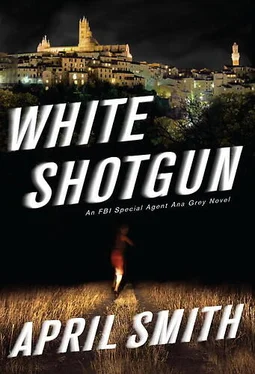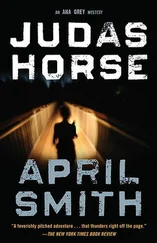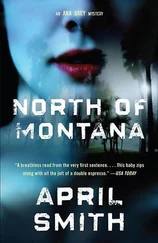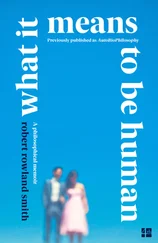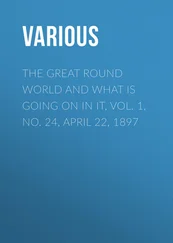April Smith - White Shotgun
Здесь есть возможность читать онлайн «April Smith - White Shotgun» весь текст электронной книги совершенно бесплатно (целиком полную версию без сокращений). В некоторых случаях можно слушать аудио, скачать через торрент в формате fb2 и присутствует краткое содержание. Год выпуска: 2011, ISBN: 2011, Жанр: Триллер, на английском языке. Описание произведения, (предисловие) а так же отзывы посетителей доступны на портале библиотеки ЛибКат.
- Название:White Shotgun
- Автор:
- Жанр:
- Год:2011
- ISBN:978-0-307-59679-6
- Рейтинг книги:4 / 5. Голосов: 1
-
Избранное:Добавить в избранное
- Отзывы:
-
Ваша оценка:
- 80
- 1
- 2
- 3
- 4
- 5
White Shotgun: краткое содержание, описание и аннотация
Предлагаем к чтению аннотацию, описание, краткое содержание или предисловие (зависит от того, что написал сам автор книги «White Shotgun»). Если вы не нашли необходимую информацию о книге — напишите в комментариях, мы постараемся отыскать её.
White Shotgun — читать онлайн бесплатно полную книгу (весь текст) целиком
Ниже представлен текст книги, разбитый по страницам. Система сохранения места последней прочитанной страницы, позволяет с удобством читать онлайн бесплатно книгу «White Shotgun», без необходимости каждый раз заново искать на чём Вы остановились. Поставьте закладку, и сможете в любой момент перейти на страницу, на которой закончили чтение.
Интервал:
Закладка:
“The ball’s been in play since we made the connection between you, your relative, and Nicoli Nicosa. We’ve been interested in him for a while, but with Italian-controlled crime syndicates, it’s impossible to get inside unless you’re trusted kin.”
“I’m not exactly trusted kin.”
“Not yet, but it could be a good fit. We had been looking at you going undercover, but last night’s events pushed the time frame.”
“Why is that?”
“The fact that you were on Edgewater Crescent Road. We had to ask ourselves, was it a coincidence you were there during the attack? Mike Donnato calls from Los Angeles to inform you of our interest, and an hour later our agent is caught in a hail of machine gun fire. Did someone overhear that conversation? Is someone out to eliminate Ana Grey — or the entire operation? The better part of valor is for you to leave London.”
Vacation was definitely over. I’d been awake twenty-four hours and traumatized more than I knew, overwhelmed by manic exhaustion. The notion of putting up a front for some long-lost relative seemed beyond my capabilities. I found myself staring numbly at a jumbled drawer of T-shirts.
Audrey Kuser looked at her watch and began to fold each one and lay it flat in the suitcase.
“When you raise three boys, you get good at this,” she said briskly. “Let me help.”
ROME
THREE
Rome is burning in the blaze of June. The heat comes at you in scorching puffs, like the fiery breath of seraphim, that eternal chorus of angels who do nothing but praise God. They must work extra hard in this fervent air, singing their adoring prayers in clashing discord with the earsplitting racket of motor scooters and jackhammers.
The ancient, toothless cabdriver has installed a navigation system in his vehicle, but not air-conditioning. We ride with the windows down, ripening by the minute, like olives. The summer crowds are global, colossal. As we come to a standstill in heavy traffic yet again, I am starting to feel as if I might evaporate along with my own sweat, leaving an empty black Brooks Brothers suit on the seat.
The taxi crawls up the Via Veneto. Every town in the U.S.A. has a “Via Veneto”—an Italian restaurant or shoe store named after the famous avenue lined with sycamore trees. Swank cafés have taken over the sidewalks in front of stately old hotels and apartment buildings, flaunting awnings and wicker chairs, tables separated by gauzy billowing curtains. I am not going there. I am going to an armed fortress.
The American embassy in Rome is housed in the Palazzo Margherita, which sounds grand, and probably was, until the threat of terrorism made it prudent to enclose the entire block in a web of concrete buttresses. We used to build embassies with walls of glass to demonstrate the pride of an open democratic society in a foreign land. Now the symbol of American diplomatic presence has been buried inside a depressing and impenetrable military stronghold.
I disembark on the Via Veneto at a confusing maze of stanchions, furnace-heated air gusting up my skirt. Somewhere close by is the disconcerting sound of fresh bubbling water. The driver has left the cab idling in the middle of the street in order to fill a water bottle from an archaic moss-covered fountain behind the barriers that has survived since God knows who was emperor. I would like to stick my head in it.
Young carabinieri are directing traffic while talking on cell phones. There are a lot of uniforms, but none seems to know the location of the main entrance, or how to interpret my paltry Italian. Why did I assume Americans would be guarding the American embassy? After several phone calls and three separate checks of credentials by three humorless Italian officers, I go through the gate and am met by a robust young lady from Virginia, who guides us through a blazing inner courtyard, zigzagging through a den of construction, until at last we come to the old chancery building, home of the ambassador and the site of sensitive consular activities, where I am relieved to be greeted by a pair of alert on-duty U.S. Marines.
We go through a gap in the scaffolding and enter a hundred-and-twenty-year-old palazzo, cross burgundy marble floors, and trudge up a stone staircase. It gets weirder.
Rome is not a solid city bound to granite like New York, but a fluid stratum of centuries of cities that seem to rise and fall and remake themselves by the hour. It exists in layers; layers of history, layers of paradox — visible and buried — all bound up in a modern hodgepodge. Nothing in Italy is only as it appears. The nice young woman describes two-thousand-year-old fresco paintings preserved in an underground passage beneath this very building. Maybe in Rome one should expect such juxtapositions, but after swishing down a mosaic-lined hallway with gold tiles, it is a bit of a shock to open a door to an exact replica of the same standard-issue FBI office that you would find in Omaha, Nebraska.
The air-conditioning is freezing, American-style, the tiny room jammed with steel filing cabinets; Old Glory droops in a corner. On the walls we have plaques and awards, and a display box of medals with the familiar caption, “Once a Marine, Always a Marine.” Coming out with hand extended from behind a wooden desk identical to the one my boss has in L.A. is the FBI legat in Italy, Dennis Rizzio — a balding, moon-faced paesano from Brooklyn.
“Agent Grey! How ya doin’? Welcome to Rome.” The accent is unrepentant.
“What can I getcha?” He opens a small refrigerator. “How about a cold soda? Outside, you could fry eggs on the sidewalk.” “Tell me about it.”
We sit across from each other in Bureau-issue high-backed leather chairs that always make me feel like a midget in a neck brace. They fit Dennis, however — a big man, easily six foot four — soft from too much gnocchi and nobody breathing down his neck to pass a fitness test. He’s wearing the traditional white shirt, gray suit, and dull-ass blue tie. The wardrobe is deliberately neutral. The mind is like a diamond drill.
I press the icy can of soda to the back of my neck.
“Coming in, did you pass the Colosseum?” “Yes, it was kind of a surprise. You’re going through a slum covered with graffiti and then — wow. There it is.” “Did you know you could scuba dive underneath it?” I must have stared blankly.
“Yeah. Under the Colosseum. They still have sewers from ancient times, underground rivers filled with statues and all kinds of crap. People go down there. Scientists. Oh, man, I thought I died and went to heaven.” “Swimming in crap?”
“ That I could do in New York,” he deadpans. “No, when I first saw the Colosseum. I always wanted to raise my girls in the old country. I wanted to hear them speak the language of my father. I can’t tell you how many years I had to finagle and kiss ass in order to get over here.”
“Special Agent in Charge Robert Galloway is from Brooklyn.”
Dennis’s sallow face almost lights up. “I just spoke to Bob on your behalf. About you coming on board. We worked the organized crime squad together in the early nineties. That sounds strange. ‘The early nineties.’ Like it was another century, which it was. How’s he doin’? Still with the turtlenecks and the cigars?”
I nod. “He was my boss on a deep cover case. I had total confidence. Always knew he had my back.”
Dennis grins. “Bob’s got a gift for undercover. This was during the famous crack cocaine epidemic we had in New York City. We did good. Put a lot of creeps in jail. Bob and I, we were working out of the social clubs on Mulberry Street. I consider myself from Little Italy, even though I had to move to Brooklyn because the yuppies came. My entire family grew up in Little Italy, four generations. My great-grandparents came over from Napoli. There was this volcano called Vesuvius?” He looks at me with round, sad eyes. “You heard about it?”
Читать дальшеИнтервал:
Закладка:
Похожие книги на «White Shotgun»
Представляем Вашему вниманию похожие книги на «White Shotgun» списком для выбора. Мы отобрали схожую по названию и смыслу литературу в надежде предоставить читателям больше вариантов отыскать новые, интересные, ещё непрочитанные произведения.
Обсуждение, отзывы о книге «White Shotgun» и просто собственные мнения читателей. Оставьте ваши комментарии, напишите, что Вы думаете о произведении, его смысле или главных героях. Укажите что конкретно понравилось, а что нет, и почему Вы так считаете.
